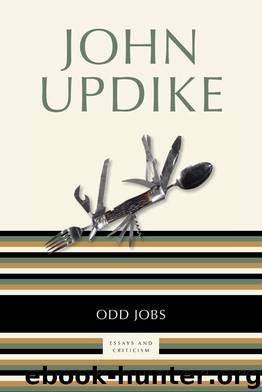Odd Jobs: Essays and Criticism by Updike John

Author:Updike, John [Updike, John]
Language: eng
Format: azw3
ISBN: 9780679645856
Publisher: Random House Publishing Group
Published: 2012-12-03T16:00:00+00:00
Iris Murdoch, too, toys with a classical model in her new book. Acastos binds together two Platonic dialogues, one of which has actually been produced in London as a short play. Miss Murdoch has taught philosophy at Oxford and published a book, The Fire and the Sun: Why Plato Banished the Artists; her own Platonism informs the intellectual and erotic seethe of her tireless novels, whose characters reside half in a solidly realized England and half in a translucent realm of immaterial passions and ideas. “Yes,” she and her favorite characters seem to keep saying, “the Good and the True and the Beautiful do exist, compellingly, bafflingly, absolutely.” Plato himself, as a somewhat minor character in these two dialogues, asserts, “People know that good is real and absolute, not optional and relative, all their life proves it,” and, when challenged by Alcibiades, gets quite sputtery about it: “Good must be pure and separate and—absolute—and—only what’s completely good can—save us—”
Alcibiades scoffs, “But your perfectly pure good thing does not exist, that’s the trouble, dear, all the world proves that!” And Plato cries, “It does, it must—it’s more real—I can’t explain—” Plato, here a callow youth of only twenty, has already developed a lot of bullying mental maneuvers. God, too, must exist: “Religion isn’t a feeling, it isn’t just a hypothesis, it’s not like something we happen not to know, a God who might perhaps be there isn’t a God, it’s got to be necessary, it’s got to be certain, it’s got to be proved by the whole of life, it’s got to be the magnetic centre of everything—” Miss Murdoch is the philosopher, and knows better than I how true to Plato’s mature thought is this rather Kantian or Kierkegaardian sense of God’s stern obligation to exist. Socrates gently says, “Then your ‘ground of things’, your ‘it must be so’, is really ‘I want it to be so’, it’s a cry of fear?” Plato begs off, and even Socrates seems to concede more than a strictly materialistic and relativist standpoint would warrant: “The most important thing in life is virtue, and virtue isn’t a mystery, it’s truthfulness and justice and kindness and courage, things we understand. Anybody can try to be good, it’s not obscure!”
Yet of course goodness is obscure, to an age that has heard it said that the state is organized violence, that humility and submission help perpetuate the powerful in their crimes, that altruism is a kind of neuroticism, that a repressed “drive” (Freud) becomes self-destructive, and that “slave morality” (Nietzsche) should be despised and supplanted. Miss Murdoch has the aesthetic problem, in contriving these new Platonic dialogues, of how many of modern thought’s dark chaotic voices to admit to the forum: to stay entirely within the intellectual frame of Periclean Athens would be a pointless tour de force, and yet her exercises would be hopelessly campy did they feel any more up-to-date than they do. “Public morality … is breaking down” no doubt expresses a timeless complaint,
Download
This site does not store any files on its server. We only index and link to content provided by other sites. Please contact the content providers to delete copyright contents if any and email us, we'll remove relevant links or contents immediately.
| Booksellers & Bookselling | General |
| History of Books |
4 3 2 1: A Novel by Paul Auster(12360)
The handmaid's tale by Margaret Atwood(7744)
Giovanni's Room by James Baldwin(7313)
Asking the Right Questions: A Guide to Critical Thinking by M. Neil Browne & Stuart M. Keeley(5747)
Big Magic: Creative Living Beyond Fear by Elizabeth Gilbert(5738)
Ego Is the Enemy by Ryan Holiday(5406)
The Body: A Guide for Occupants by Bill Bryson(5067)
On Writing A Memoir of the Craft by Stephen King(4924)
Ken Follett - World without end by Ken Follett(4713)
Adulting by Kelly Williams Brown(4560)
Bluets by Maggie Nelson(4541)
Eat That Frog! by Brian Tracy(4508)
Guilty Pleasures by Laurell K Hamilton(4433)
The Poetry of Pablo Neruda by Pablo Neruda(4084)
Alive: The Story of the Andes Survivors by Piers Paul Read(4013)
White Noise - A Novel by Don DeLillo(3999)
Fingerprints of the Gods by Graham Hancock(3982)
The Book of Joy by Dalai Lama(3965)
The Bookshop by Penelope Fitzgerald(3838)
